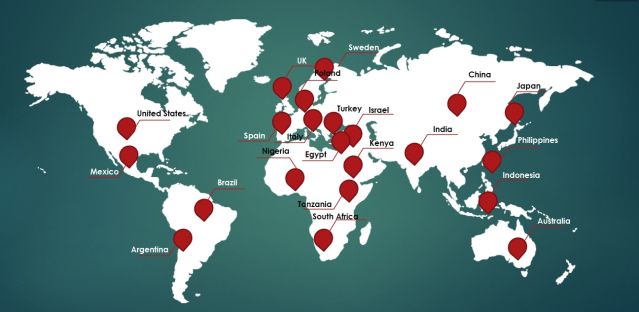Happiness
The Global Flourishing Study
The release of the first wave of a 200,000-person study on flourishing.
Updated March 28, 2024 Reviewed by Abigail Fagan
Key points
- The first wave of the Global Flourishing Study data was released February 2024.
- Flourishing varies by demographic group, but these relations themselves vary by country.
- Studying flourishing allows us to promote flourishing across the globe.
Flourishing Around the Globe
We seek to flourish as individuals, as communities, as nations, and as a global society. The opportunities to flourish are tremendous, but so are the obstacles. We must employ numerous strategies to understand and promote flourishing within our societies. One such strategy is making good use of flourishing data. We are thus delighted to announce the release of the first wave of the Global Flourishing Study data, and to provide some initial insights from it.

The Global Flourishing Study
The Global Flourishing Study (GFS) is a study of over 200,000 participants, from 22 geographically and culturally diverse countries, with nationally representative samples in each country, and with planned annual data collection on the same panel of individuals for five waves of data. The study includes participants from Argentina, Australia, Brazil, China (Hong Kong), Egypt, Germany, India, Indonesia, Israel, Japan, Kenya, Mexico, Nigeria, the Philippines, Poland, Turkey, South Africa, Spain, Sweden, Tanzania, the United Kingdom, and the United States; it includes a set of questions on well-being along with demographic, social, economic, political, religious, personality, childhood, community, health and character-based questions.
The study itself is being carried out in collaboration between scholars at the Human Flourishing Program at Harvard and Baylor’s Institute for Studies of Religion, with data collection by Gallup, and with support from a consortium of funders including the John Templeton Foundation, the Templeton Religion Trust, the Templeton World Charity Foundation, the Fetzer Institute, the Paul Foster Family Foundation, the Wellbeing for Planet Earth Foundation, Well Being Trust, and the David & Carol Myers Foundation.
The first wave of data was just recently released in February 2024 and is being hosted by the Center for Open Science. As an open-access data resource, any researcher can receive the data by submitting a pre-registration to the Center for Open Science.
We now in fact have a team of over 50 researchers working away on the data and will be releasing a series of peer-reviewed research papers on the study towards the end of the year. However, we can already discuss some initial, intriguing insights.
Some Initial Results
While we will be looking at numerous aspects of well-being in our research analyses, we will restrict comment here to some initial results that pertain to our own flourishing assessment, spanning happiness, health, meaning, character, relationships, and financial stability (the measure is available in over 40 languages across the globe). Our future work will also look at these various aspects of flourishing separately, along with numerous other aspects not covered by our core assessment, such as peace, balance, mastery, and freedom, along with various more nuanced aspects of happiness, health, character, social connectedness, and financial well-being.
As discussed further in a short Gallup.com article, in most of the 22 countries, on a scale from 0-10, the average flourishing score falls between 6.5 and 8, with the only exceptions being Indonesia where the average score was slightly above 8.0 and also Turkey and Japan, with average scores slightly below 6.5. In the United States, consistent with some of our prior work pre-pandemic, the mean score for this 2023 wave of data was just above seven (7.11).
Aggregated over the 22 countries, men and women had roughly similar flourishing scores, with men scoring only very slightly higher than women. Interestingly, however, there was quite a bit of variation across countries. For example, in Japan, women report notably higher flourishing than men, whereas in Brazil men report notably higher flourishing than women.
In a number of countries, with the 2023 data, we now find that flourishing increases with age, a pattern we had previously noted in the United States starting in 2022. Unfortunately, many young people are not doing particularly well today. But this increasing-with-age pattern was not the case in all countries, and some countries (e.g. India and Egypt) have more traditional U-shaped patterns relating age and well-being, with younger individuals and older individuals doing better than those in mid-life. A more thorough investigation of these results, and of trying to understand the variation across countries, will be a topic of our upcoming research.
Many of the other demographic relationships are perhaps not particularly surprising: those who are employed report higher flourishing than those who are unemployed; those who are married report higher flourishing than those single or divorced; those with higher levels of education report higher flourishing than those with less education. And, as discussed in our Gallup.com article, and as we’ve discussed elsewhere, religion too is related to flourishing in important ways. All of these will likewise be important topics for future investigation.
With only one wave of data, we can provide descriptive analyses as above, but these cross-sectional descriptive statistics should not be interpreted as implying causality. In contrast, some of the analyses we are currently working on are retrospectively examining childhood experiences and present flourishing, and future analyses will make use of multiple subsequent waves of data, and these will have more potential to provide causal insight. We look forward to all that we might potentially learn later this year, and in the years ahead.
Promoting Global Flourishing
We are excited about the months ahead and the research that the Global Flourishing Study will enable. We hope also that researchers all over the world will access the data and learn from it. And we hope that collectively the insights that emerge from the Global Flourishing Study will help us promote flourishing, and re-orient policy to enhance flourishing, in societies all around the world. We’ll certainly be sharing more in the months ahead.
References
Chen, Y., Johnson, B.R. Ritter, Z., VanderWeele, T.J. (2024). Global Study Aims to Uncover How Humans Flourish. Gallup.com
Related Articles
Balboni, T.A., VanderWeele, T.J., Doan-Soares, S.D., Long, K.N.G., Ferrell, B., Fitchett, G., Koenig, H.G., Bain, P., Puchalski, C., Steinhauser, K.E., Sulmasy, D.P., and Koh, H.K. (2022). Spirituality in Serious Illness and Health. JAMA, 328:184-197.
Chen, Y., Kim, E.S., and VanderWeele, T.J. (2020). Religious service attendance and subsequent health and well-being throughout adulthood: evidence from three prospective cohorts. International Journal of Epidemiology, 49:2030–2040.




